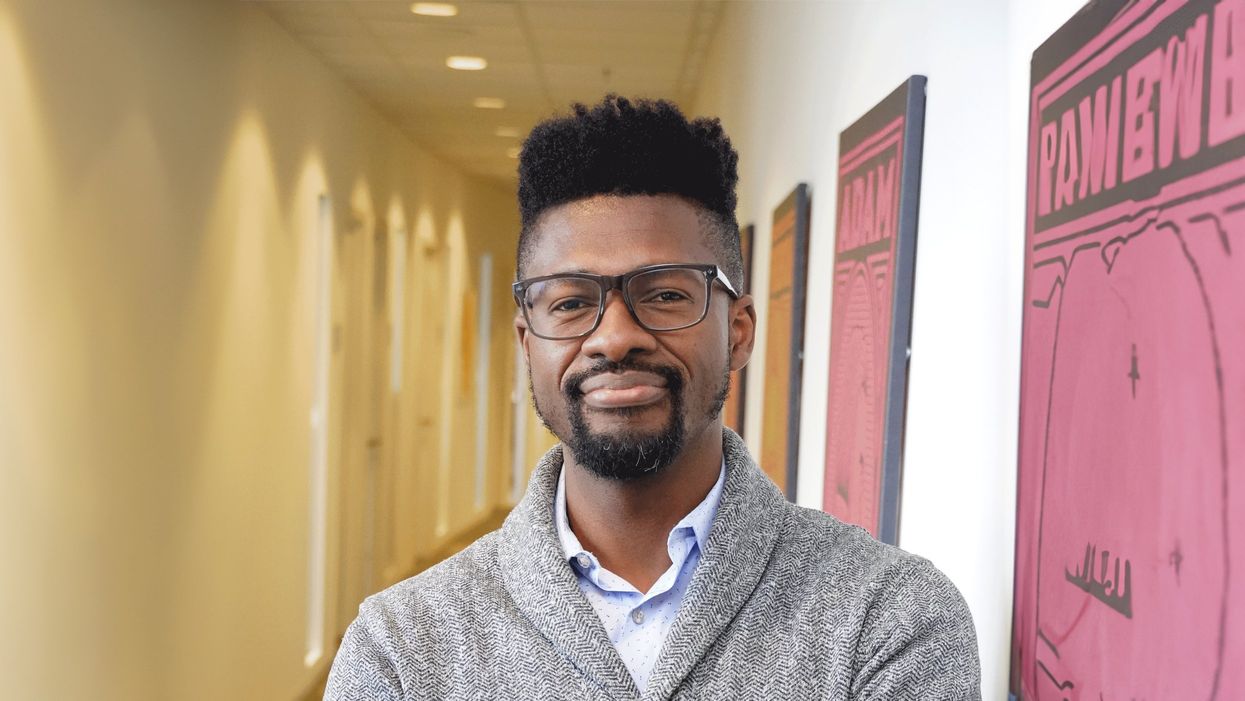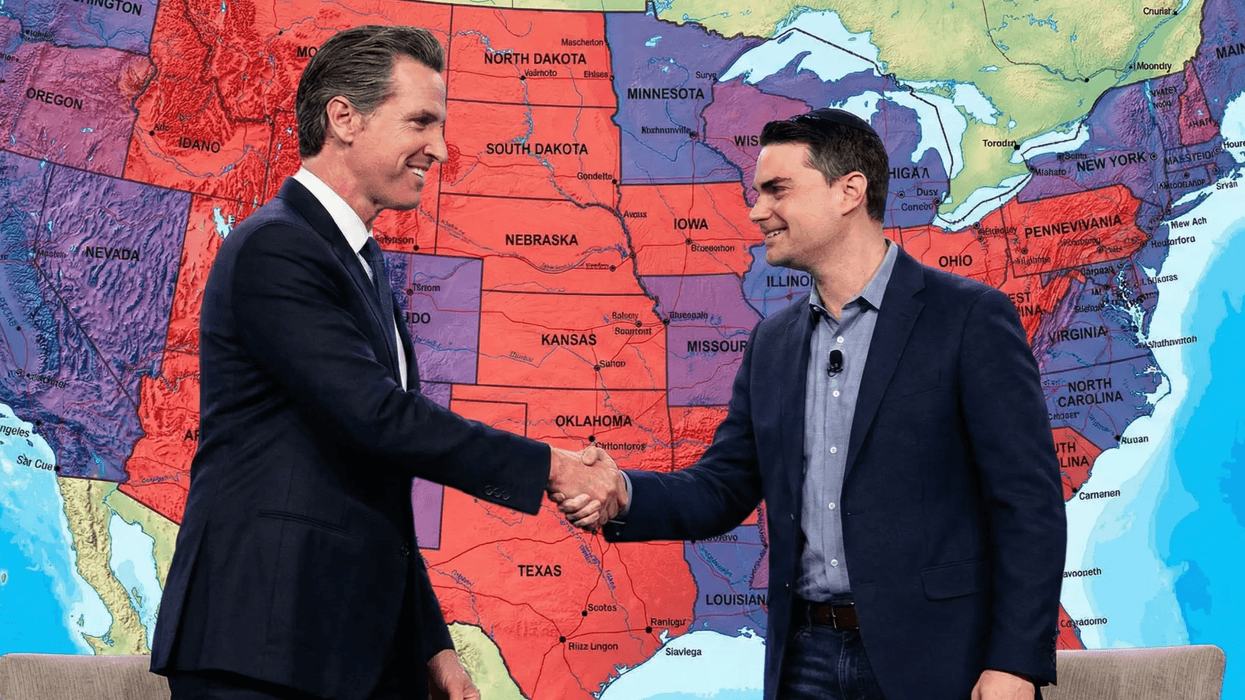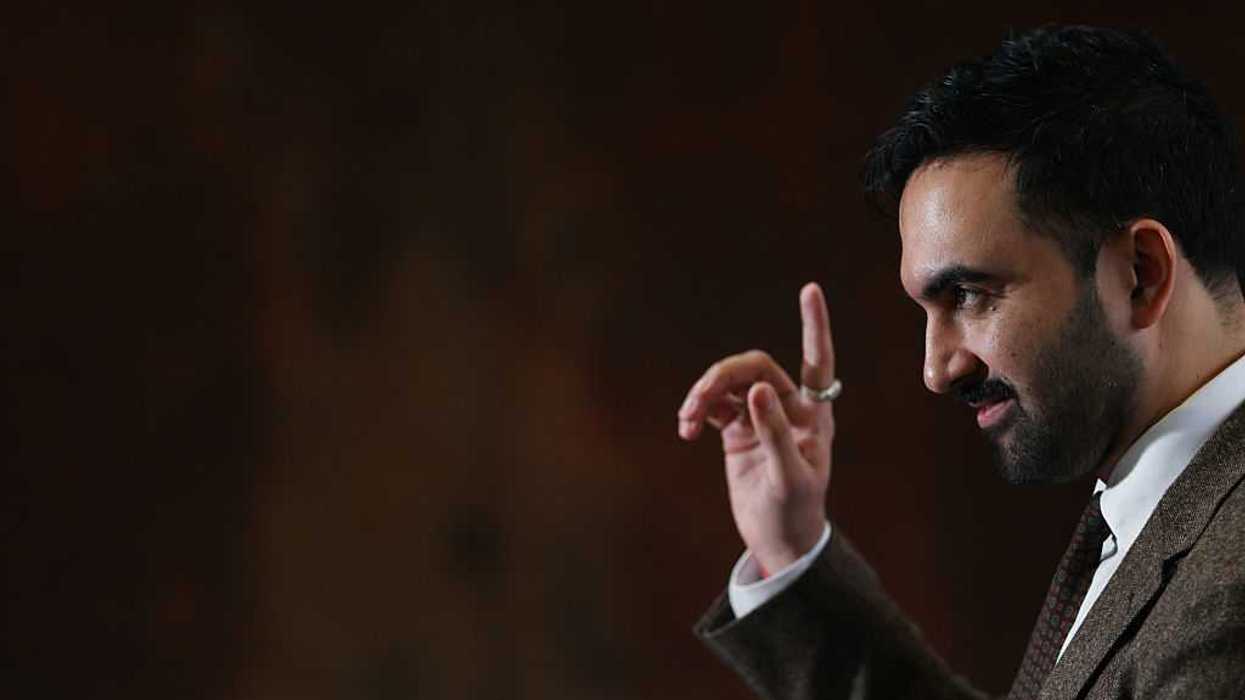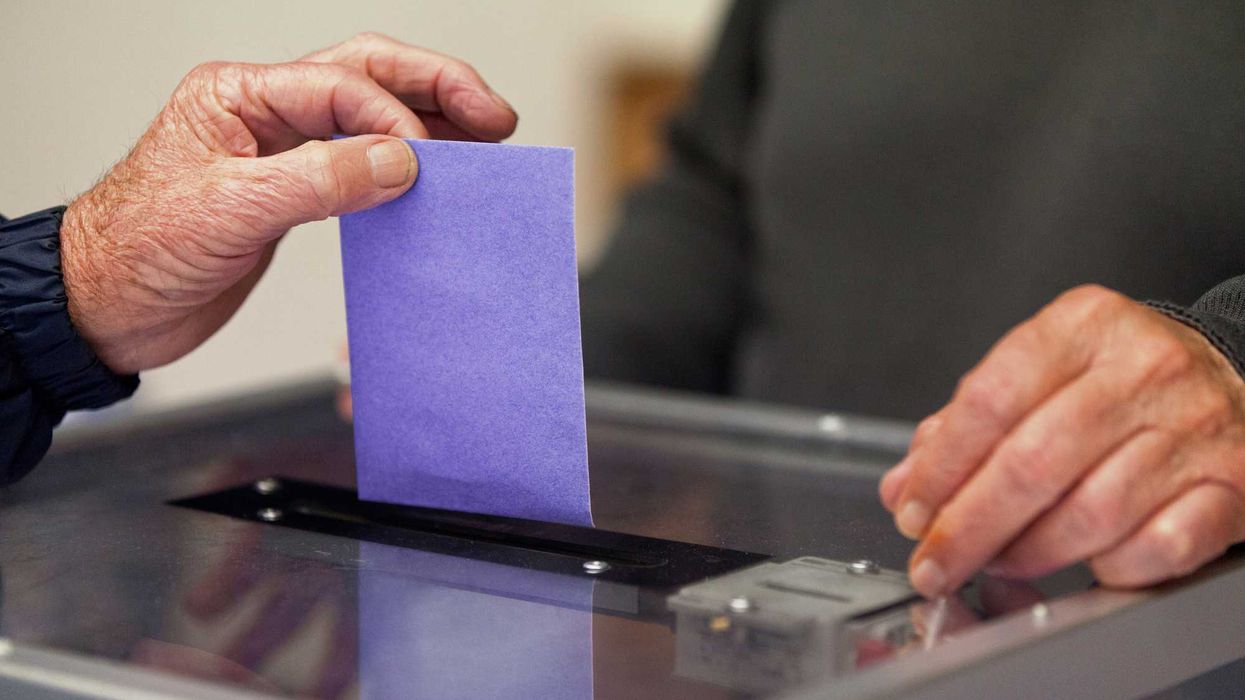Berman is a distinguished fellow of practice at The Harry Frank Guggenheim Foundation, co-editor of Vital City, and co-author of "Gradual: The Case for Incremental Change in a Radical Age." This is the sixth in a series of interviews titled "The Polarization Project."
The documentary film “ Undivide Us ” brings together Americans from across the political spectrum for conversations about abortion, immigration, guns and other controversial issues. According to Ben Klutsey, who helped facilitate the conversations, “Participants came in expecting shouting matches, but they ended up exchanging phone numbers and wanting to stay connected because they found each other to be incredibly interesting. People are not as polarized as we think they are when we look at our screens and social media.”
This could also serve as a mission statement for Klutsey, who directs the program on pluralism and civil exchange at the Mercatus Center, a libertarian research center housed at George Mason University. At Mercatus, Klutsey is attempting to build a community of students and scholars who can exchange ideas and coexist with one another peacefully despite their political differences. Klutsey also regularly interviews leading thinkers about liberalism for the online journal Discourse.
I spoke with Klutsey about what he’s learned from these conversations, the reaction to the war in Gaza on American campuses and the corrosive effects of threats of political violence. This transcript has been edited for length and clarity.
Greg Berman: I think you are the first person I’ve ever met who has the word “pluralism” in their job title. I'm wondering what pluralism means to you and Mercatus.
Ben Klutsey: At Mercatus, we love ideas. And what we were starting to see three or four years ago was an environment where it was more and more difficult for people to contest ideas and engage in open inquiry. And because ideas are our bread and butter, we decided to think a lot about the state of polarization right now and whether there's anything that we as an organization that cares about a free and open society can do to help cultivate the habits for civil discourse. The question that we try to ask fundamentally with the program on pluralism and civil exchange is: How can we live together? How can we coexist when there are deep divides and differences?
In terms of what pluralism means to me personally, I've learned a lot from John Inazu's book, “ Confident Pluralism.” John would say that there are two key features of pluralism. One is inclusion, and that as a society becomes more and more morally enlightened, we begin to include more people who have been previously marginalized. Think about the women's suffrage movement. Think about civil rights. Think about the changes we’ve seen in terms of people with disabilities. Over the decades, we’ve worked to include more and more people in our society. That's important.
But John Inazu also highlights another important feature of pluralism, which is dissent.
In a pluralistic society, people need the space to be able to dissent from orthodoxies, to form their own associations that diverge from what others might think. And so a truly pluralistic society is a society that has both inclusion and dissent.
GB: As I dig into the topic, I find that a lot of people are talking about polarization these days, but I don’t think everyone is necessarily talking about the same thing. You have various different types of polarization — ideological, educational, political, affective, elite, etc. It is difficult to solve a problem if you can't diagnose it properly. So I guess my question is: Do we have a polarization problem in the U.S. at the moment? And if so, what kind of polarization should we be worried about?
BK: I recently had a conversation with Rachel Kleinfeld, who's at the Carnegie Endowment for International Peace, that got me thinking a lot about this. You're right that there are different kinds of polarization. There's political polarization, which measures the ideological distance between the parties. I think in terms of political polarization, you’ll see that the American people aren't that polarized — it's more of an elite phenomenon that you see when you look at places like Congress.
But I think affective polarization is a big, big, big challenge right now. Our views on the issues haven't changed that much over the past several decades. If anything, we’ve moved a little bit closer to each other. But the way we feel about each other has changed over time. And that is driven by all kinds of things, including social media and the way that Congress functions. So we feel worse about each other.
The funny thing is that these perceptions are often mistaken. There's some really interesting research where they ask Democrats, “Do you think that Republicans would say it's okay for the Covid vaccine to be released several weeks before the 2020 election if they knew that it was going to help Donald Trump?” And they'll ask Democrats to guess where they think Republicans will be on this. And the numbers are off the chart. They say that 80 to 90 percent would approve of this. And then they ask Republicans the same question, and the majority of Republicans don't think it's a good idea to release it then, even if it's going to help Donald Trump.
And then they ask Republicans, “Hey, what do the Democrats think about immigration?” And they estimate that 90 percent want full open borders. But when you ask Democrats, they'll say, “No, we think that there should be comprehensive structural reforms and there should be some restrictions.” So what Democrats actually think is much more nuanced.
I think the challenge is that we are overestimating how extreme the other side is. And that helps to fuel the perception that the other side is a threat and that their views are dangerous to your existence. And that makes it difficult for us to solve problems together.
The other problem that Rachel identifies is what she calls pernicious polarization. We have political incentives and structures that drive us towards polarization. In our electoral system, you have relatively small numbers of Americans who participate in the primary process. Only the most energized and exercised about issues come out to vote. And these are the folks who tend to be a bit more polarized. And so they're picking candidates that are more extreme. And given gerrymandering, in lots of places, winning the primary basically means you are going to win the election. So we end up with politicians who are very polarized.
And then you have the media environment where the incentives are to show the sensational and the outrageous. This gives people this impression that we are in an existential crisis. I think affective polarization is a problem, and it's a problem because of these two things — the pernicious incentives that drive us towards polarized options.
GB: I don't know if you've seen the research coming out of the Polarization Research Lab, but it suggests very, very low levels of public support for political violence in this country. It is obviously a good thing that we don't have political violence in the way we did in the ’60s. But we need to be concerned not just about actual violence, but about threats of violence as well. Threats of violence, even if they are not carried out, can be corrosive to our civic culture. In that context, I wanted to ask you a little bit about the reactions to the war in Gaza. Some of the protests have drawn criticism for using rhetoric that some people have found intimidating or that seem to call for the destruction of Israel or violence against Jews. Are people right to be concerned about such things? At what point does legitimate protest tip over into something more dangerous?
BK: I do think people ought to be concerned when there is rhetoric that might generate threats towards certain people. The First Amendment gives a lot of leeway for a lot of different kinds of speech. I think it's important for us to maintain not just the legality, but also the culture around free speech.
When I look at what's happening around college campuses, I worry that there is a lot of binary thinking. There isn’t a lot of nuance. Young people who are energized around justice also need to think about other virtues. Justice must be balanced with mercy and with prudence and with toleration.
I do wonder though whether a lot of this stuff that we are seeing is based primarily in elite institutions. I wonder how many colleges are going through these types of tests. The Ivy League schools are not representative of all institutions. I also wonder to what extent some of this has been a media phenomenon. That's not to say it's not a problem. My question is just whether we are thinking about it in the right proportions when we look at the general landscape.
GB: Given what you said at the start about the importance of dissent to a healthy pluralistic society, how worried are you about the doxing we've seen on campus, where some students feel like they have to disguise themselves so they won’t become the targets of deliberate efforts to take away their jobs for saying there should be a ceasefire in Gaza?
BK: Joshua Cherniss wrote a wonderful book called “Liberalism in Dark Times.” One of the things that he talks about is the challenge that ruthlessness poses for liberalism. When you see your opponent engaged in ruthless behavior, like doxing or canceling, there's a certain temptation to respond with the same level, if not more, ruthlessness. But Cherniss says that’s a mistake. He believes that liberalism is a kind of disposition. It's not just a set of ideas, but it's also a certain kind of temperament as well.
GB: I very much like Cherniss’ idea of “tempered liberalism.” I wish more people embraced it as an approach to the world. But it seems to me that it is very, very hard to spread this way of thinking.
BK: Yeah, it's hard. I think we need exemplars who are capable of teaching others how to adopt this kind of temperament. Ilana Redstone, a sociologist at the University of Illinois, teaches a course called “ Beyond Bigots and Snowflakes,” where she tries to introduce students to Isaiah Berlin’s thinking about foxes and hedgehogs. I think we have to get to a place where we are training more young people to be foxes. There are many different ways to see the world.
It is also important to teach people that they could be wrong. As Jonathan Rauch talks about in his book, “The Constitution of Knowledge,” two of the most important features of a liberal society are fallibilism and empiricism. We always have to look at the results, collect information, to be able to have an accurate assessment of what's going on on the ground.
If we are going to spread the kind of liberalism we’re talking about here, it's going to take educational institutions, it's going to take families. These values have to be modeled. I think that we are in a difficult time right now where we don't have leaders who are modeling this type of disposition. I'm hoping that it is a fever that will soon break. I think that there is a big role for leaders to inspire people towards their better angels, if you will.
GB: When you spoke with Monica Harris, the executive director of the Foundation Against Intolerance & Racism, she talked about diversity, equity and inclusion as something that sounded like it would help create a more tolerant society but that it is actually dividing us. Do you think DEI is pushing us closer to pluralism, further away from pluralism or something in between?
BK: I think it depends on how it's done. I think when identity is based on phenotypical traits and things like that, I think it can become dangerous. But you can also have a kind of training that recognizes that we are all part of this amazing human race and that regardless of our subtle differences, we all have equal dignity. Which is why I always go back to liberalism. The idea that you have as much right to be here as I do, and on the basis of that, we give each other mutual respect … that is important. And I think that if DEI is highlighting these things, I think that it's going to be great. But if it's not doing that, then I think that it will create challenges and will further divide us long term.
GB: You talked to Seth Kaplan, the author of “Fragile Neighborhoods,” recently. Echoing Robert Putnam, he argues that there has been a decline in the kinds of local institutions that used to help us build relationships across differences and that when people are relationship-poor, they end up becoming too invested in politics. Does that ring true to you?
BK: It does. People are looking for a sense of identity and meaning, and politics is increasingly where people are finding that. I find it fascinating that negative attitudes towards inter-party marriages are now much higher than interracial or interfaith marriages. It's wild that politics is really taking a new kind of importance for a lot of people when it comes to identity. There is a real danger of overdoing it.
GB: When you talked to Robert Talisse, who wrote “Overdoing Democracy," he said: "We have to make space in our lives for cooperative activities in which politics plays no role whatsoever." That really resonated with me. I find myself skeptical about the utility of bringing together political partisans to talk about the issues of the day. I don't think it's harmful, but I'm skeptical that that's going to help solve the problem of polarization.
BK: I think it depends on the way that it's done. Mónica Guzmán, who I also interviewed, wrote a book called “I Never Thought of It That Way.” When the 2016 election happens, her county votes 76 percent for HillaryClinton, and she and her friends are just completely shocked that the rest of the country would vote the other way. So she takes a bus, goes down to a different county in Oregon that had the opposite of what they experienced, where 76 percent of them voted for Donald Trump. And what she writes in the book is that it was an experience that she thought was incredibly meaningful. One of the guys in this rural county said it was the first time he felt seen — that folks from urban areas never really come out to talk to them. I think that if the types of conversations that we have are about curiosity and about seeing one another, rather than trying to win arguments and shame each other, I think it could get somewhere. But if it’s just a debate, with the blues on one side and the reds on another, that doesn’t do anything.
Talisse’s point is about people doing something together that has nothing to do with politics, where politics are irrelevant in that context. My challenge to him is that it is very hard to think of what that could be. Everything has politics to it these days. I mean, during the pandemic just going to the gym could be political because of all the positioning and the posturing around mask wearing. I'd like to believe that there are still things, whether it’s helping kids to read or helping senior citizens with chores, where it is possible to form the kinds of citizen friendships that Talisse talked about.
GB: I've spent my entire life in the nonprofit sector, so I'm a big believer that nonprofits are a force for good in the world. Recently I’ve been seeing nonprofits take on a fair amount of criticism from people like Ruy Teixeira that they are part of the problem, that they are contributing to polarization because they have become too extreme. I'm wondering whether you've run across this critique and what you make of it?
BK: I haven't thought too much about that. If I had to guess, I’d say that nonprofits are going through a similar thing as other American institutions. In Congress, you have a dynamic where many politicians are more moderate than their staffers. So the staffers are nudging and pushing their leaders for more extreme positions. Whenever you are in a mission-oriented environment, where “justice” or "doing the right thing" is a motivating factor for people, you tend to have this challenge with proportionality.
GB: You always ask all of your guests whether they're optimistic about the future. Where's your optimism meter pointing these days?
BK: At the Mercatus Center, we are trying to run a lot more Pluralist Labs. These involve bringing students from across the country together to have conversations where we ask them to engage in reflective listening. You have to assume the role of the other person when they're sitting right next to you. I think that there are lots of students who are really interested in looking at the nuances of issues. They just need a bit more courage to stand up. I think America is at its best when people see a challenge and are trying to find the solutions to those challenges. Sometimes we may go through some fits and starts. But I think over time we will get this right. We'll get this right.
This article originally appeared on HFG.org and has been republished with permission.




















Trump & Hegseth gave Mark Kelly a huge 2028 gift